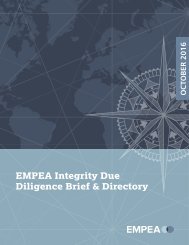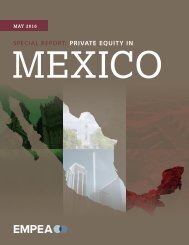Create successful ePaper yourself
Turn your PDF publications into a flip-book with our unique Google optimized e-Paper software.
to participate in funds domiciled in “tried and trusted<br />
jurisdictions,” and that this quality was more important<br />
than its onshore or <strong>of</strong>fshore status. Interestingly, the<br />
study also indicated that the investors were equally or<br />
more concerned with the brand names <strong>of</strong> the fund’s<br />
service providers. To reduce anxiety among the investors,<br />
the fund managers will prefer jurisdictions familiar to<br />
their investors. 31<br />
A 2011 Oliver Wyman study noted that alternative investment<br />
funds (hedge funds, PE funds, and real estate funds) have<br />
traditionally preferred <strong>of</strong>fshore domiciles due to “favourable<br />
tax regimes, confidentiality, lower levels <strong>of</strong> ‘red tape,’ and<br />
the higher quality <strong>of</strong> fund infrastructure available at these<br />
locations.” The study did find, however, that <strong>of</strong>fshore<br />
centres have attracted some negative attention and that<br />
certain institutional investors require onshore funds, due to,<br />
for example, their own bylaws / constitutions and perceived<br />
investor demand. 32 Along these lines, we note that political<br />
rationales have led the European Investment Bank (EIB)<br />
to invest increasingly only in funds domiciled onshore. In<br />
contrast, however, the majority <strong>of</strong> private equity funds<br />
in which the African Development Bank has invested are<br />
legally domiciled <strong>of</strong>fshore in Mauritius. 33<br />
In a 2014 follow-on study, Oliver Wyman explored the<br />
primary domiciles <strong>of</strong> alternative investment funds in the<br />
Americas and Europe and highlighted key domicile decision<br />
drivers across private equity, real estate and hedge<br />
funds. 34 The authors noted the following characteristics <strong>of</strong><br />
jurisdictions typically considered by these fund managers:<br />
an attractive tax system with favourable tax rates and<br />
a network <strong>of</strong> double taxation avoidance agreements; a<br />
legal environment that accommodates flexible limited<br />
partnership regimes and follows international standards<br />
and regulations, especially with respect to investor<br />
protection rights; high-quality local service providers;<br />
manageable investor requirements with respect to redomiciliation,<br />
registration, and fees; and responsive,<br />
trustworthy authorities.<br />
In addition, we found a broad consensus that domicile<br />
choices are also a function <strong>of</strong> country risk. Fund managers<br />
generally prefer to domicile in regions that exhibit political,<br />
regulatory, fiscal, and economic stability. 35 For example, in<br />
most cases funds domiciled in jurisdictions that lacked the<br />
regulatory capacities to negotiate a co-operation agreement<br />
with the European Securities and Market Authority (ESMA)<br />
and comply with the Alternative Investment Fund Managers<br />
Directive (AIFMD) would be unable to market to European<br />
investors. 36 Moreover, beyond the fact that political instability<br />
gives rise to increased fiscal uncertainty, 37 research suggests<br />
that without democratic political stability, institutions that<br />
protect investors, such as courts and regulators, cannot<br />
function properly. 38<br />
4.3. Economic Impact <strong>of</strong> Becoming a<br />
Private Equity Hub for Domiciliation<br />
The economic impact <strong>of</strong> PE domiciliation is also significant.<br />
On a conceptual level, domiciling PE funds in a region<br />
brings additional tax revenue as well as growth in the overall<br />
fund management (e.g., administrators, custodians), and<br />
financial and legal services industries. 39 The establishment<br />
<strong>of</strong> tax stability and regulatory stability may attract other<br />
industries as well, such as hedge funds and real estate<br />
funds. 40<br />
It is important to note, however, that the PE domiciliation<br />
does not imply a boost in PE deals in the country. In<br />
fact, attractive PE domiciles facilitate PE activity in other<br />
countries through economic cooperation treaties (such<br />
as double taxation avoidance agreements): for example,<br />
Luxembourg and the Cayman Islands appear to have a<br />
very modest amount <strong>of</strong> economic activity from PE-funded<br />
firms’ back <strong>of</strong>fice operations. While we found no empirical<br />
studies exploring the economic impact <strong>of</strong> increased PE<br />
domiciliation attractiveness, we suspect a relatively modest<br />
net impact with respect to indicators such as aggregate<br />
employment—particularly with respect to the low-skilled<br />
jobs that many emerging countries most need to create. It<br />
is important to note that while broadly speaking, financial<br />
sector development is essential to economic growth and<br />
poverty reduction—a claim supported by a large amount<br />
<strong>of</strong> empirical evidence—the developmental benefits that<br />
directly stem from legally housing PE groups is not clear. 41<br />
The costs associated with the financial and regulatory shifts<br />
required to house the back <strong>of</strong>fice operations <strong>of</strong> PE firms,<br />
such as the development <strong>of</strong> suitable investment vehicles<br />
and the onshoring <strong>of</strong> the specific accounting and clerical<br />
services to PE funds (see Section 5 for more detail), are<br />
unlikely to drive proportionate development growth to these<br />
expenses.<br />
In other words, the economic growth associated specifically<br />
with PE domiciliation is unlikely to be “pro-poor” growth, a<br />
phrase <strong>of</strong>ten used by the World Bank to describe types <strong>of</strong><br />
growth strategies that boost the average income <strong>of</strong> the poor<br />
56 |





